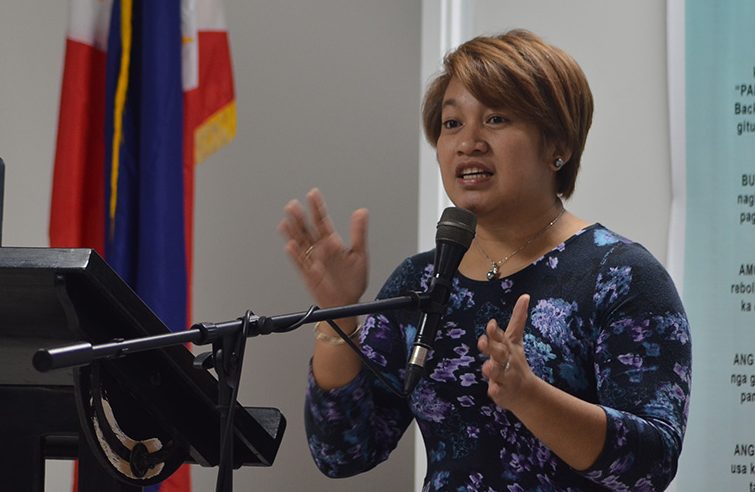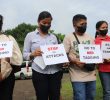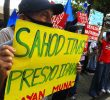
Government peace panel member Atty. Angela Librado-Trinidad gives updates on the peace talks between the government and the National Democratic Front during a forum held at the Ateneo de Davao University on Tuesday, September 13. (Zea Io Ming C. Capistrano/davaotoday.com)
DAVAO CITY — A government peace panel member urged the women’s sector to take active roles in the peace process as the women are among the sectors most affected by the ongoing armed conflict.
Atty. Angela Librado-Trinidad, the only woman member of the government peace panel said that the women’s role in the succeeding rounds of the talks will be important because the output of the talks represent the demands of the women “as a sector and as part of the constituency”.
“One woman is never enough. We are participants because we have a stake in this peace process. The stake is our life, our sustenance and our survival as women. So it is very important for us to be there,” she said in a forum at the Ateneo de Davao University on Tuesday, September 13 dubbed “A Journey of Peace from Oslo, to Davao and Back”.
Librado-Trinidad said that the current composition of the committees only has one woman in a five-member committee, except for the working committee on the socio-economic reforms where there are two women out of five members.
She said, however, that the small number of women in the panels should not deter the sector from engaging actively in the peace negotiations.
Women monitors
“Whatever happens, they need us to say what we want to see in the future, especially now that both parties have declared separate ceasefires. We do not expect a non – commission of violations even during the ceasefire season,” she said.
She said the panels need “women monitors” to bring to the public’s attention the violations against the women’s sector like sexual abuses and harassments which could happen even during a ceasefire.
Peace talks as a women’s issue
Former Gabriela Women’s Partylist Rep. Luzviminda Ilagan, who is a member of the committee on socio-economic reforms, said peace talks is not just an issue of men, “but is more of a women’s issue”.
“Forty four percent of the labor force is women and they are found predominantly in the services sector where a large number are on a contractual status or are low paid and are in precarious jobs, dirty, dangerous jobs, compared to men who are most economically productive in their young to middle years,” she said.
“Even if women get older they continue to work for their families,” she said.
She also said that while the women share with the issues of landlessness, joblessness, low wages with the men, the women sector “are doubly oppressed and burdened by gender-specific issues such as forms of violence and discrimination.”
What women want
Ilagan said that based on their consultations with various women’s groups in the country the women’s demands are:
1) Expansion of social services including affordable hospital services; maternal safety; sexuality education for young women; reproductive and maternal health systems; the repeal of anti-women policies like no home birthing and the privatization of hospitals and increase on the budget for health;
2) Decent and socialized housing for all and a stop to the demolition operations without adequate rehabilitation; moratorium on the payments of Pag-ibig housing loans, especially for the unemployed; access of women-headed households to housing programs through adequate financial support system;
3) Immediate relief and assistance to victims of natural and man-made disasters, including emergency shelter assistance funds;
4) Upgrading of the public education system; integrating gender-sensitivity in the curriculum; increasing the budget for colleges and universities; raising the salaries of teachers; recognizing and supporting Lumad schools and students;
5) Establishing one-stop crisis center to respond to cases of violence against women and children; financial and legal assistance to victims; the operationalization of violence against women desks in barangays; implementation of the Magna Carta of women to protect and promote also the rights of the Lesbians, Gays, Bisexual and Transgender and to provide psychosocial and financial aid to victims of VAWC;
6) Support to genuine land reform, ensuring that widows and single mothers can be entitled to land ownership and agricultural support systems;
7) Support to national industrialization; wage increases and end to contractualization;
8) Ban on irresponsible and destructible mining; cancellation of permits of mining corporations and indemnification to communities ravaged by large scale mining;
9) Promotion and protection of the rights of the Lumads, the Bangsamoro to self determination and to a peaceful existence without threat and harassment; and
10) Acknowledgement of the needs of senior citizens;
Ilagan said that “peace is not the absence of war, but addressing the root cause of the conflict.”
“The basis of a life truly peaceful is satisfaction of human needs,” she said.(davaotoday.com)










